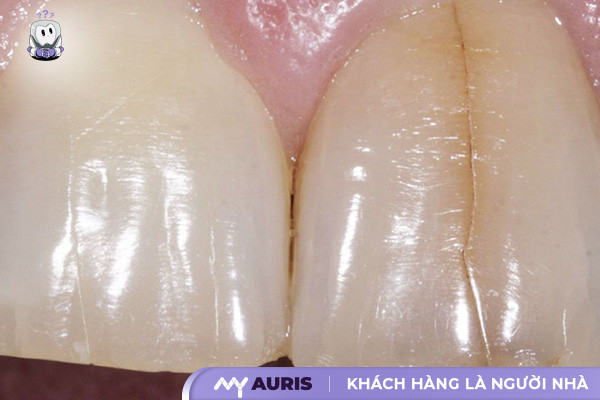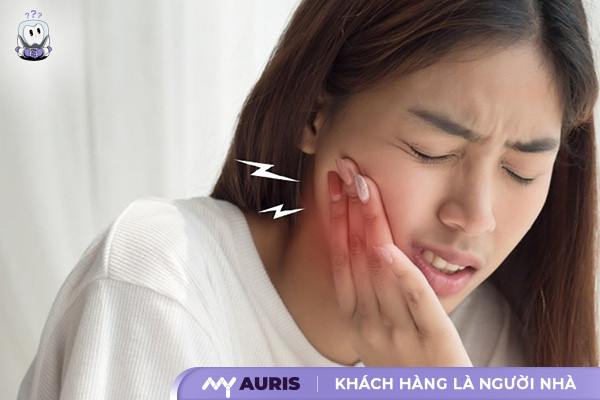Tooth sensitivity is a sign of excessive tooth sensitivity, often occurring when the protective enamel layer is worn away. The main causes include eating acidic foods, brushing teeth too hard, receding gums or dental procedures. What should I do? Reduce tooth sensitivity by brushing your teeth gently with specialized toothpaste, using warm water of 30-40°C for oral hygiene, and avoiding things that are too hot or cold. These good habits protect tooth enamel, helping to effectively prevent and improve lower tooth sensitivity.
What is tooth sensitivity?
Tooth sensitivity, a common dental problem, causes pain, discomfort, affecting oral health and human life. Teeth are sensitive when eating hot or cold foods, when brushing teeth, when eating sweets, drinking ice water, and even when breathing. This dental condition occurs when the dentin, the layer below the enamel, is exposed. Dentin contains many small tubes leading to the dental pulp, where nerves are concentrated. When physical stimuli (hot, cold, pressure), chemical (sweet, sour) come into contact with the dentin, they transmit signals through the canal to the dental pulp, causing pain and sharpness. Tooth sensitivity that persists and does not go away requires timely treatment.
Tooth sensitivity can be an oral symptom of many dental diseases, such as enamel erosion, tooth decay, gingivitis, cracked teeth, and dead pulp. Determining the cause of tooth sensitivity is very important to have appropriate ways to treat tooth sensitivity and effectively prevent tooth sensitivity. Oral health is important. Don’t be subjective about tooth sensitivity.

Causes of tooth sensitivity
Each cause of tooth sensitivity requires a different treatment for tooth sensitivity. Enamel wear, tooth decay, and gingivitis require treatment by a dentist. Sensitivity toothpaste can help reduce sensitivity, but is not a substitute for professional treatment. Cracked teeth and dead pulp require more complex dental intervention. Understanding the cause and timely treatment helps protect oral health and avoid dangerous complications.
Tooth enamel wear, cavities, gingivitis: The leading culprits
Tooth enamel, the protective layer of teeth, is worn away due to brushing too hard, using a hard toothbrush, eating a lot of sour foods, creating conditions for bacteria to attack the dentin, causing sensitivity. Tooth decay and gingivitis are also common causes. Tooth decay destroys tooth enamel and dentin, creating cavities, causing pain and sensitivity. Gingivitis causes the gums to recede, exposing the dentin, increasing the risk of sensitivity.

Cracked tooth, dead pulp: Serious problem
A cracked tooth, even if small, also creates a way for bacteria to enter, causing sensitivity and pain. Dead tooth pulp due to tooth decay or trauma, causing severe pain and prolonged sensitivity helps prevent dangerous complications.

Habits, diet: Significant impact
Poor oral hygiene habits, teeth grinding, eating a lot of sweets, sour foods, drinking ice water, carbonated drinks erode tooth enamel, increasing the risk of tooth sensitivity A good diet for teeth and proper oral hygiene helps protect tooth enamel and prevent tooth sensitivity.
Causes of tooth sensitivity: From habits to diseases
Teeth sensitivity when eating hot and cold foods, when brushing teeth, and when eating sweets are dental symptoms. Many causes of this tooth condition include worn enamel, tooth decay, gingivitis, cracked teeth, and dead pulp. Poor oral hygiene habits and bad diet also contribute to tooth sensitivity. susceptible to tooth sensitivity
Tooth sensitivity, a common dental problem, affects many people. Recognizing the signs and subjects susceptible to tooth sensitivity helps prevent and treat it promptly.
Signs of tooth sensitivity
Teeth sensitivity when eating hot or cold foods, when brushing teeth, eating sweets, or drinking ice water are common signs. Sharp pain, dull pain, pain when eating, pain when breathing, and pain when touching teeth are also oral symptoms of tooth sensitivity that does not go away face.
Subjects susceptible to tooth sensitivity
People with poor oral hygiene habits, brushing too hard, using hard toothbrushes can easily wear down tooth enamel, increasing the risk of tooth sensitivity. People who often eat sour and sweet foods, drink ice water, and carbonated drinks are also susceptible to tooth sensitivity People with common dental diseases such as tooth decay, gingivitis, tooth enamel erosion, cracked teeth are at high risk of tooth sensitivity.
Who is susceptible to tooth sensitivity?
Tooth sensitivity, a common tooth condition, affects many people at risk Higher muscles, including:People with poor oral hygiene habits, people who grind their teeth, and people with dental diseases such as tooth decay, gingivitis, and tooth enamel erosion. Diet also plays an important role. People who often eat sour and sweet foods and drink ice water are at high risk of tooth sensitivity.
Effects of tooth sensitivity
It seems to be a problem Small teeth have a big impact on health and life. Understanding these effects helps us pay more attention to oral health and treat them promptly.
Effects on diet and nutrition
Teeth sensitivity when eating hot and cold foods, when eating sweets, or drinking ice water causes patients to limit their eating. This affects a good oral diet, causes nutritional deficiencies, and affects health. Tooth sensitivity that does not go away for a long time causes difficulty chewing and swallowing, reduces appetite.
affects psychology and quality of life
Pain and discomfort due to tooth sensitivity causes stress, fatigue, affects psychology, and sleep. Tooth sensitivity when brushing makes patients hesitate to clean their teeth, creating conditions for other dental diseases to develop. This dental condition reduces the quality of life and makes it difficult to communicate and work.
Affects general oral health
Tooth sensitivity can be an oral symptom of serious dental diseases such as tooth decay, gingivitis, worn enamel, cracked teeth, and dead pulp. If not treated promptly, these diseases will progress more seriously, causing tooth loss and affecting overall oral health.

Tooth sensitivity: Negative impact on life
Tooth sensitivity, a common dental problem, causes a lot of discomfort and affects health. This dental condition not only causes pain and discomfort when eating, but also affects psychology and quality of life.
From eating to psychology, health
Sensitive teeth make eating difficult. Teeth are sensitive when eating hot and cold foods, sweets, or drinking ice water, making the patient afraid, limiting their diet, and affecting nutrition. Prolonged pain causes stress, insomnia, and reduces quality of life. Tooth sensitivity also affects oral hygiene habits. Tooth sensitivity when brushing makes patients lazy to clean, creating conditions for bacteria to grow, causing other oral diseases.
What to Do With Your Teeth:How to Reduce Tooth Sensitivity at Home
Tooth sensitivity causes discomfort, affecting eating and living. Many effective ways to reduce tooth sensitivity at home help you control this condition and improve your oral health.
Use toothpaste to reduce tooth sensitivity
Toothpaste to reduce tooth sensitivity contains ingredients that help soothe pain and protect dentin. Choose the right toothpaste, brush your teeth properly, at least twice a day. This is a simple and convenient way to treat toothache.
Adjust your diet
Limit eating sweets, sour foods, drinking ice water, and carbonated drinks. These foods erode tooth enamel, increasing the risk of tooth sensitivity. Prioritize foods that are good for your teeth such as vegetables, fruits, milk, and filtered water. A good oral diet helps protect tooth enamel and reduce sensitivity.
Use physiological saline to gargle
Saline helps clean teeth, reduce inflammation, and reduce sensitivity. Rinse your mouth with physiological saline after eating and before going to bed. This is a simple, effective way to care for your teeth.

Reducing tooth sensitivity at home: Simple but effective
Tooth sensitivity, a common dental problem, causes pain and discomfort. Fortunately, there are many effective ways to reduce tooth sensitivity at home, helping you control this condition and improve your oral health.
Proper oral care: The first step
Brushing your teeth properly and using toothpaste to reduce tooth sensitivity is an important step. Choose a soft-bristled toothbrush, brush your teeth gently, avoid brushing too hard, causing tooth enamel erosion. Sensitivity-reducing toothpaste contains ingredients that help protect dentin and reduce sensitivity. Gargling with physiological saline also helps clean teeth, reduce inflammation, and reduce sensitivity.
Treate tooth sensitivity completely at the dental clinic
The dentist will diagnose the cause, provide appropriate treatment, help you regain oral health, and eat comfortably.
Methods to treat tooth sensitivity at the dentist
Doctor You can use special pain-relieving toothpaste and apply fluoride to the sensitive tooth area. In cases of tooth enamel erosion, dental fillings help protect dentin and reduce sensitivity. Tooth decay and gingivitis require thorough treatment to eliminate the cause of sensitivity.
Modern dental technology supports treatment
Modern dental technology helps treat tooth sensitivity effectively and safely. Dental laser helps treat gingivitis and reduce sensitivity. Dental filling and porcelain crown techniques are aesthetic, convenient, and bring long-lasting results.
Find out the cause, treat properly
Before treatment, the doctor will examine and diagnose the cause of tooth sensitivity. Each cause requires a different treatment for toothache. Tooth decay and gingivitis need to be treated completely. Worn tooth enamel and cracked teeth may require fillings or crowns. Dead tooth pulp needs root canal treatment.
Treatment of tooth sensitivity at the dentist: The definitive solution
Tooth sensitivity affects health and life. When home remedies are ineffective, treatment at a dental clinic is the definitive solution. Dentist has expertise, experience, and modern dental technology to help accurately diagnose the cause and provide effective treatment.
Diverse treatment methods, suitable for each case
Depending on the cause of tooth sensitivity, the doctor will recommend an appropriate treatment method. Tooth enamel erosion can be treated by applying fluoride and fillings. Tooth decay and gingivitis need to be treated thoroughly. Cracked teeth may require fillings or crowns. Dead tooth pulp requires endodontic treatment. Your doctor can also prescribe special pain-relieving toothpaste and instructions on how to properly care for your teeth.

Sensitive teeth: When to see a dentist?
Tooth sensitivity, although common, should not be subjective. Knowing when to see a dentist helps you get timely treatment and avoid dangerous complications.
Teeth sensitivity persists and does not reduce
If tooth sensitivity persists and does not go away, tooth sensitivity reduction toothpaste is ineffective, you need to see a dentist. Persistent tooth sensitivity can be a sign of serious dental disease.
Severe pain, affecting daily activities
Teeth sensitivity when eating hot and cold foods, when brushing teeth, when eating sweets, drinking ice water, severe pain, affecting eating, daily activities, needs Go see a doctor now. Prolonged pain causes fatigue, stress, and affects health.
Accompanied by other symptoms
Tooth sensitivity with swollen gums, bleeding gums, tooth abscess,fever, headache, need to see a dentist immediately. This can be a sign of severe infection, requiring timely treatment.
When do you need to see a dentist for tooth sensitivity?
Tooth sensitivity, a common dental problem, causes discomfort and affects daily life. However, not all cases of tooth sensitivity require seeing a dentist immediately. So when do you need to seek professional help?
Persistent tooth sensitivity that does not respond to home remedies
If you have tried home remedies to reduce tooth sensitivity such as using toothpaste to reduce tooth sensitivity, changing your diet, but the condition does not improve, Even worse, see a dentist. Persistent tooth sensitivity that does not go away can be a sign of more serious problems such as tooth decay, gingivitis, worn tooth enamel, cracked teeth.
Severe pain, affecting quality of life
Teeth sensitivity when eating, drinking, brushing, severe pain, affecting Daily activities, sleep, make you tired and stressed. Don’t endure the pain. See your dentist for timely diagnosis and treatment.
Other accompanying symptoms appear
If tooth sensitivity is accompanied by other symptoms such as swollen gums, bleeding gums, tooth abscess, fever, headache, you need to see a dentist immediately. This may be a sign of a serious infection and needs to be treated promptly to avoid dangerous complications. Regular dental check-ups are also very important, helping to detect dental problems early and treat them promptly.





